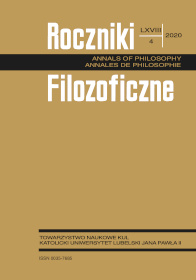Metaphysical Creationism and the Paradoxes of Evolutionary Theism: A Contribution to the Discussion within Contemporary Thomism
Abstrakt
Metafizyczny kreacjonizm a paradoksy teizmu ewolucyjnego: przyczynek do dyskusji w ramach współczesnego tomizmu
Autor artykułu dowodzi, że metafizyczny kreacjonizm, z którym spotykamy się w filozofii św. Tomasza z Akwinu, w odróżnieniu od kreacjonizmu amerykańskiego oraz teologiczno-‑biblijnego, jest teorią, która wyrasta z czysto filozoficznego wyjaśnianie początków świata i człowieka. Nie jest zatem ideą biblijną przeniesioną na teren filozofii. Podobnie jak teizm metafizyki Arystotelesa, a także teizm metafizyki św. Tomasza z Akwinu nie jest teizmem religijnym (teologicznym), lecz teizmem czysto filozoficznym (metafizycznym), gdyż wyrasta z metafizycznego wyjaśniania rzeczywistości. Kreacjonizm metafizyczny jest ostatecznym wyjaśnieniem źródła istnienia bytów, które dane są nam w doświadczeniu, jako niekonieczne w istnieniu i zmienne. Natomiast kreacjonizm amerykański, jest interpretacja biologiczno-kosmologiczną biblijnej prawdy o stworzeniu świata w określonym przedziale czasowym (paradygmat 7 dni) i w punkcie wyjścia odwołuje się do danych Objawienia, które chce naukowo potwierdzić
Artykuł został podzielony na dwie części. W części pierwszej zostały przedstawione węzłowe elementy metafizycznej teorii stworzenia ex nihilo i jej rozumienie. W drugiej zaś części artykułu zostały przywołane elementy teizmu ewolucyjnego, które z punktu metafizycznego kreacjonizmu są źródłem różnych paradoksów, a niekiedy i absurdów oraz domagają się ponownego przemyślenia.
Bibliografia
Aquinas. Summa Contra Gentiles. Vol. 2, edited by Pietro Caramello, Pietro Marc, and Ceslas Pera. Taurini: Marietti, 1961.
Aquinas. Summa Contra Gentiles: prawda wiary chrześcijańskiej. Vol. 1. Translated by Zofia Włodek and Włodzimierz Zega. Poznań: W Drodze, 2003.
Aristotle. Metafizyka. Translated by Tadeusz A. Żeleźnik. Polish translation edited by Mieczysław Albert Krąpiec and Andrzej Maryniarczyk. Lublin: Polskie Towarzystwo Tomasza z Akwinu, 2017.
Austriaco, Nicanor Pier Giorgio, James Brent, Thomas Davenport, and John Baptist Ku. Thomistic Evolution: A Catholic Approach to Understanding Evolution in the Light of Faith. Providence, RI: Cluny Media, 2016.
Chaberek, Michał. Aquinas and Evolution. Leicester: Chartwell Press, 2017.
Chaberek, Michał. Kościół a ewolucja. Warsaw: Fronda, 2012.
Chaberek, Michał. “Tomasz z Akwinu a teistyczny ewolucjonizm.” Zeszyty Naukowe KUL 59, no. 1 (2016): 3–25.
George, Marie. “What Would Thomas Aquinas Say about Intelligent Design?” New Blackfriars 94 (November 2013): 676–700.
Huxley, Julian. “The Evolutionary Vision: The Convocation Address.” In Issues in Evolution: The University of Chicago Centennial Discussions, vol. 3, Evolution After Darwin, edited by Sol Tax and Charles Callender, 249–61. Chicago: University of Chicago Press, 1960.
Jodkowski, Kazimierz. Spór ewolucjonizmu z kreacjonizmem. Podstawowe pojęcia i poglądy. Warsaw: Megas, 2007.
Kamiński, Stanisław. “Explanation in Metaphysics. Wyjaśnianie w metafizyce.” In Stanisław Kamiński, On the Methology of Metaphysics. Z metodologii metafizyki, 176–202. Lublin– Rome: Polskie Towarzystwo Tomasza z Akwinu, 2018.
Krąpiec, Mieczysław A., and Stanisław Kamiński. “The Specificity of Metaphysical Cognition. Specyficzność poznania metafizycznego.” In Stanisław Kamiński, On the Metaphysical Cognition. O poznaniu metafizycznym, 9–94. Lublin–Rome: Polskie Towarzystwo Tomasza z Akwinu, 2020.
Kloskowski, Kazimierz. Filozofia ewolucji i filozofia stwarzania. Warsaw: Wydawnictwo ATK, 1999.
Lichacz, Piotr. “Czy stworzenie wyklucza ewolucję?” In Teologia św. Tomasza z Akwinu dzisiaj, edited by Bogusław Kochaniewicz, 71–94. Poznań: Uniwersytet Adama Mickiewicza, 2010.
Maryniarczyk, Andrzej. “‘Parvus Error in Principio Magnus Est in Fine.’ Thomas Aquinas’s Reinterpretation of the Understanding of Being and Essence as the Basis for the Discovery of the First Cause as ‘Ipsum Esse’.” Roczniki Filozoficzne 67, no. 4 (2019): 27–51.
Maryniarczyk, Andrzej. Dlaczego stworzenie ‘ex nihilo’. Teoria metafizycznego kreacjonizmu. Lublin: Polskie Towarzystwo Tomasza z Akwinu, 2018.
Szumera, Grzegorz. Metafizyka stworzenia: Świętego Tomasza z Akwinu teoria creatio ex nihilo. Lublin: Towarzystwo Naukowe KUL, 2017.
Życiński, Józef. Bóg i stworzenie. Zarys teorii ewolucji. Lublin: Gaudium, 2011.
Życiński, Józef. God and Evolution. Fundamental Questions of Christian Evolutionism. Translated by Kenneth W. Kemp and Zuzanna Maślanka. Washington, DC: Catholic University of America Press, 2006.
Copyright (c) 2020 Roczniki Filozoficzne

Utwór dostępny jest na licencji Creative Commons Uznanie autorstwa – Użycie niekomercyjne – Bez utworów zależnych 4.0 Międzynarodowe.





